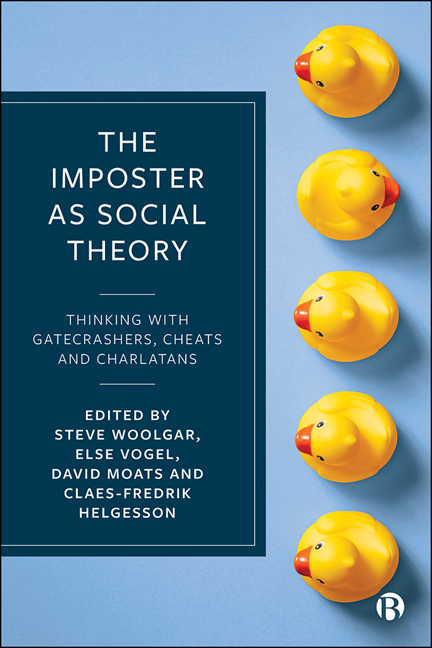Book contents
- Frontmatter
- Contents
- List of Figures and Boxes
- Notes on Contributors
- Preface
- 1 Thinking with Imposters: The Imposter as Analytic
- 2 The Desire to Believe and Belong: Wannabes and Their Audience in a North American Cultural Context
- 3 A Menagerie of Imposters and Truth-Tellers: Diederik Stapel and the Crisis in Psychology
- 4 Learning from Fakes: A Relational Approach
- 5 Imitations of Celebrity
- 6 Natural Imposters? A Cuckoo View of Social Relations
- 7 Conjuring Imposters: The Extraordinary Illusions of Mundanity
- 8 States of Imposture: Scroungerphobia and the Choreography of Suspicion
- 9 The Face of ‘the Other ’: Biometric Facial Recognition, Imposters and the Art of Outplaying Them
- 10 Faking Spirit Possession: Creating ‘Epistemic Murk ’ in Bahian Candomblé
- 11 The Guerrilla’s ID Card: Flatland against Fatland in Colombia
- 12 Good Enough Imposters: The Market for Instagram Followers in Indonesia and Beyond
- 13 Thinking beyond the Imposter: Gatecrashing Un/Welcoming Borders
- 14 Postscript: Thinking with Imposters – What Were They Thinking?
- Index
8 - States of Imposture: Scroungerphobia and the Choreography of Suspicion
Published online by Cambridge University Press: 22 December 2021
- Frontmatter
- Contents
- List of Figures and Boxes
- Notes on Contributors
- Preface
- 1 Thinking with Imposters: The Imposter as Analytic
- 2 The Desire to Believe and Belong: Wannabes and Their Audience in a North American Cultural Context
- 3 A Menagerie of Imposters and Truth-Tellers: Diederik Stapel and the Crisis in Psychology
- 4 Learning from Fakes: A Relational Approach
- 5 Imitations of Celebrity
- 6 Natural Imposters? A Cuckoo View of Social Relations
- 7 Conjuring Imposters: The Extraordinary Illusions of Mundanity
- 8 States of Imposture: Scroungerphobia and the Choreography of Suspicion
- 9 The Face of ‘the Other ’: Biometric Facial Recognition, Imposters and the Art of Outplaying Them
- 10 Faking Spirit Possession: Creating ‘Epistemic Murk ’ in Bahian Candomblé
- 11 The Guerrilla’s ID Card: Flatland against Fatland in Colombia
- 12 Good Enough Imposters: The Market for Instagram Followers in Indonesia and Beyond
- 13 Thinking beyond the Imposter: Gatecrashing Un/Welcoming Borders
- 14 Postscript: Thinking with Imposters – What Were They Thinking?
- Index
Summary
Introduction
Recent decades have witnessed the emergence of an international agenda to reorganize welfare states and their social security provisions around the ‘activation’ of benefit recipients, often in the form of ‘welfare-to-work’ programmes. In the United Kingdom this agenda has been pursued through an emphasis on ‘behavioural conditionality’, whereby entitlement to benefits is made conditional upon the ‘active job-seeking’ or ‘work preparation’ efforts of claimants, whose conduct becomes the object of ongoing monitoring. Controversially, failure to meet these conditions results in punitive and potentially lengthy benefit sanctions – the withdrawal of benefit payments. In the context of pervasive political and media narratives about ‘benefit scroungers’, questions about entitlement frequently become freighted with concerns about fraud and imposture and, for claimants, with an urgent need to appear genuine and deserving.
This chapter explores the choreography of suspicion in welfareto-work services. It begins by situating these contemporary social policies with respect to ‘scroungerphobia’ and long-standing anxieties about skivers and benefit cheats. It then describes these policies and their recent development in more detail, with a particular focus on behavioural conditionality. This section underlines the way policy discourse has often drawn a distinction between practices of support and practices of sanction. Based on fieldwork, the next two sections elaborate the everyday experience, practice and management of suspicion in welfare-to-work services. They show how uncertainty is produced and maintained, and how suspicion is administered and made durable through bureaucratic organization and practice. Here the chapter underscores how this suspicious mode of disordering permeates the field. It is not simply the claimant who is rendered suspect, their status indeterminate, but the meaningfulness of welfareto-work ‘support’ and those who provide it. The final section considers moments when the administration of suspicion fails or breaks down, and the state and its agents become the fakes and frauds.
Scroungerphobia and the anxieties of imposition
Like the other contributions to this volume this chapter uses ‘the imposter’ as an analytic device. This perspective is sensitive to the sorts of anxiety about status and entitlement that frequently attend the welfare state, and which policies of behavioural conditionality and sanctions simultaneously heighten and promise to assuage. The word imposter is rarely encountered in this context, however, and imposter dramas instead revolve around the figure of the undeserving claimant or ‘benefit scrounger’.
- Type
- Chapter
- Information
- The Imposter as Social TheoryThinking with Gatecrashers, Cheats and Charlatans, pp. 171 - 190Publisher: Bristol University PressPrint publication year: 2021



